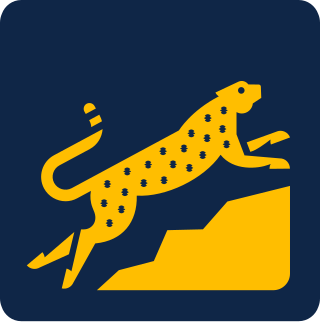In computing, serialization is the process of translating a data structure or object state into a format that can be stored or transmitted and reconstructed later. When the resulting series of bits is reread according to the serialization format, it can be used to create a semantically identical clone of the original object. For many complex objects, such as those that make extensive use of references, this process is not straightforward. Serialization of objects does not include any of their associated methods with which they were previously linked.
Server-side scripting is a technique used in web development which involves employing scripts on a web server which produces a response customized for each user's (client's) request to the website. Scripts can be written in any of a number of server-side scripting languages that are available. Server-side scripting is distinguished from client-side scripting where embedded scripts, such as JavaScript, are run client-side in a web browser, but both techniques are often used together. The alternative to either or both types of scripting is for the web server itself to deliver a static web page.
Programming languages can be grouped by the number and types of paradigms supported.
The PHP Extension and Application Repository, or PEAR, is a repository of PHP software code. Stig S. Bakken founded the PEAR project in 1999 to promote the re-use of code that performs common functions. The project seeks to provide a structured library of code, maintain a system for distributing code and for managing code packages, and promote a standard coding style. Though community-driven, the PEAR project has a PEAR Group which serves as the governing body and takes care of administrative tasks. Each PEAR code package comprises an independent project under the PEAR umbrella. It has its own development team, versioning-control and documentation.

Capistrano is an open-source tool for running scripts on multiple servers; its main use is deploying web applications. It automates the process of making a new version of an application available on one or more web servers, including supporting tasks such as changing databases.
Planet is a feed aggregator that runs on a web server. It creates pages with entries from the original feeds in chronological order, most recent entries first.
libxml2 is a software library for parsing XML documents. It is also the basis for the libxslt library which processes XSLT-1.0 stylesheets.
QuickCheck is a software library, specifically a combinator library, originally written in the programming language Haskell, designed to assist in software testing by generating test cases for test suites – an approach known as property testing.
This is a comparison of notable free and open-source configuration management software, suitable for tasks like server configuration, orchestration and infrastructure as code typically performed by a system administrator.
This is a comparison of regular expression engines.
Chipmunk2D is a 2-dimensional real-time rigid body physics engine written by Scott Lembcke that is designed to be portable, lightweight, fast, and easy to use. Prior to version 7, two main versions of the library existed. Chipmunk2D Free was written purely in C99, and freely available under the terms of the MIT License. Chipmunk2D Pro was a proprietary upgrade designed for development on mobile devices. It included several high-level subroutines in Objective-C, and floating-point optimizations for the ARM processor. However, after version 7 the project was fully open-sourced.

The Haskell Platform is a collection of software packages, tools and libraries that create a common platform for using and developing applications in Haskell. With the Haskell Platform, Haskell follows the same principle as Python: "Batteries included". Since 2022, the Haskell Platform has been deprecated.
Mustache is a web template system. Mustache is described as a logic-less system because it lacks any explicit control flow statements, like if and else conditionals or for loops; however, both looping and conditional evaluation can be achieved using section tags processing lists and anonymous functions (lambdas). It is named "Mustache" because of heavy use of braces, { }, that resemble a sideways moustache. Mustache is used mainly for mobile and web applications.
Ansible is a suite of software tools that enables infrastructure as code. It is open-source and the suite includes software provisioning, configuration management, and application deployment functionality.
In computer science and visualization, a canvas is a container that holds various drawing elements. It takes its name from the canvas used in visual arts. It is sometimes called a scene graph because it arranges the logical representation of a user interface or graphical scene. Some implementations also define the spatial representation and allow the user to interact with the elements via a graphical user interface.

Foreman is an open source complete life cycle systems management tool for provisioning, configuring and monitoring of physical and virtual servers. Foreman has deep integration to configuration management software, with Ansible, Puppet, Chef, Salt and other solutions through plugins, which allows users to automate repetitive tasks, deploy applications, and manage change to deployed servers.

RocksDB is a high performance embedded database for key-value data. It is a fork of Google's LevelDB optimized to exploit multi-core processors (CPUs), and make efficient use of fast storage, such as solid-state drives (SSD), for input/output (I/O) bound workloads. It is based on a log-structured merge-tree data structure. It is written in C++ and provides official language bindings for C++, C, and Java. Many third-party language bindings exist. RocksDB is free and open-source software, released originally under a BSD 3-clause license. However, in July 2017 the project was migrated to a dual license of both Apache 2.0 and GPLv2 license. This change helped its adoption in Apache Software Foundation's projects after blacklist of the previous BSD+Patents license clause.
Fast Artificial Neural Network (FANN) is cross-platform programming library for developing multilayer feedforward artificial neural networks (ANNs). It is free and open-source software licensed under the GNU Lesser General Public License (LGPL).


